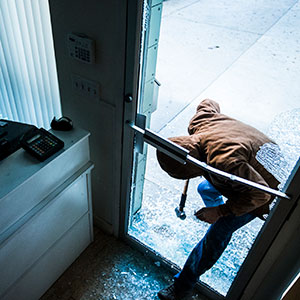
Jewelers should be continuously aware of their surroundings and take precautions to prevent their stores from being hit by criminals, said the experts on a “Security 101” panel at JCK Las Vegas.
Andrew Chipman, vice president, Jewelers Block, at Berkley Asset Protection, said that while jewelry crime has dropped, retailers should not let their guard down.
“We have seen a little bit of a lull,” he said. “We would caution everyone that the threat is still out there. And we would urge everyone to make security a bit part of your operation.”
That means continually updating your staff about possible threats.
“In a lot of cases, the information doesn’t trickle down,” said Howard Stone, vice president of global risk services and analytics for Jewelers Mutual. “If you have a meeting every morning, utilize that. Communication is key.”
Retailers should also forge relationships with local law enforcement and mall security.
“Invite [the police] in your store to tour around and see the layout of your store,” said Stone. “So when they have to respond, they’ll know what they’re walking into.”
Beyond that, the panelists advised jewelers to do the following to avoid becoming a target:
• Hire an armed security guard, preferably a retired law enforcement officer.
“The best thing you can have is a security guard at your door,” said Scott Guginsky, vice president of the Jewelers’ Security Alliance. “There’s no reason a group’s going to go to your store if they can go to a store without a guard.”
Guards are also helpful if a situation escalates, he added.
“Retired police officers have training [with guns]. Unfortunately, when jewelers are armed with firearms, we’ve had some cases recently when shots were fired, people were hit, and you can find yourself in a lot of trouble.”
• Install a buzzer on your front door.
“You control your environment,” Guginsky said. “You can stop a guy coming in your store with a ski mask on.”
• Look for indicators someone is up to no good.
“The surgical masks are a dead giveaway,” said Guginsky. “Not many people wear cheap blue surgical masks going into a jewelry store. If someone’s wearing a blue surgical mask, sunglasses, they’re wearing hoodies, they’re disguising themselves.… Who shops for a nice diamond with sunglasses? Ask them to take their glasses off so they can get a good look at your nice merchandise.”
Other warning signs: People who walk with their hands behind their back, make an effort not to touch countertops (so they don’t leave fingertips), are talking on the phone, or smell like marijuana (thieves sometimes smoke beforehand to relax themselves).
Chipman said that a large group coming in can also be a red flag—they may be planning a distraction theft.
• Don’t forget to check the parking lot.
“[Thieves] back into parking spots,” said Guginksy. “They have cars with no license plates. Take a look at your parking lot, and make sure there’s no one watching your store.”
• If someone is acting strangely, offer them a glass of water.
“They won’t want their fingerprints on the glass,” said Guginsky. “If they don’t want to drink it, that could be a sign.”
• Ask new customers for identification before taking out merchandise.
Prior to showing particularly valuable pieces to unknown or suspicious customers, jewelers should ask for photo ID, Chipman said. Jewelers can say that their “insurance policy requires it.”
In addition, always remember to only show one item at a time.
• If you notice something wrong, have a warning word.
“Have a keyword or phrase, something that you can share amongst your team,” Stone said. “It could be ’What time is lunch?’ That will alert your staff to either go to a certain area or respond on the floor to give assistance. There’s safety in numbers.”
• If you sense an immediate threat, contact law enforcement.
“Call the precinct in your neighborhood,” Guginsky said. “If you think something’s not right, in the parking lot call them, ask ‘Can you send someone?’ They’re not there just to deal with a crime that’s occurred, they are there to prevent crime.”
• When a suspicious person leaves the store, record what you noticed in a suspicious incident log.
“Just write: ‘On April 2, a man came in, he looked at the cameras, he had a mask on, he was sweating,’” Guginsky said. “This way, if a crime does occur, you go right back to the videotape, it makes life a lot easier for law enforcement.”
• Have shatter-resistant glass on your cases.
That will make them harder to break into and increase the chance that the thieves leave blood on the case, making them easier to identify,
• Use GPS technology in case items get stolen.
“You can put an Apple Airtag for $25, $30,” Guginsky said. “You can utilize that device in the cushion of your watch. That’ll show where it’s going if it’s stolen.”
• Place all your merchandise in a safe every night.
“When people are not putting jewelry into their safes at night, it’s a sitting target,” Chipman said. “Even if you know that it’s low-value goods, the bad guys that are walking by, they don’t know that. That’s a quick brick through the window, and a quick mess of your store.”
• Even better: Put the merchandise in multiple safes.
Thieves “can’t go through three or four safes in one night,” Guginsky said. “Split [the merchandise] up, so they’re not sure where to go.”
He also said jewelers should make sure they use top-security safes, such as a TR/TL30x6, which are rarely breached. Cheaper models can be broken into with tools sold at Home Depot.
• Answer any alarms.
“There’s been many cases where the alarm’s gone off and somebody, whether it’s the manager or the owner, doesn’t respond,” said Stone. “Many times law enforcement is not going to respond unless it’s an actual verified alarm. So when that phone rings—as much as it’s not the best thing to wake up in the middle of the night, to go to a store—you want to do that.”
He also cautioned that store owners should wait for police to arrive before they go into the store.
• Be wary of so-called “communication errors.”
“When you’re a jeweler you have to take power failures, internet interruptions, communication errors seriously,” Guginsky said. “You have to know who responds on a holiday weekend, who responds on Sunday. Otherwise, you’re going to come in on Monday and have the shock of your life.”
When errors occur, jewelers should visit their stores—though, again, they should make sure they’re accompanied by law enforcement before they venture inside.
• Vary your routine.
“You have to switch things up,” Guginsky said. “Don’t drop things off, go to the bank, the same time every day or every week. You want to make it more difficult for people to figure out your routine.”
• If you are the victim of a crime, don’t resist.
“[Criminals] don’t go into stores looking to maim or hurt somebody,” Guginksy said. “They are looking to take merchandise. There’s no item of merchandise worth chasing somebody, pulling a firearm. The most important thing is that you have proper insurance, so you go home at night.”
The author was the moderator of the panel.
(Photo: Getty Images)
- Subscribe to the JCK News Daily
- Subscribe to the JCK Special Report
- Follow JCK on Instagram: @jckmagazine
- Follow JCK on X: @jckmagazine
- Follow JCK on Facebook: @jckmagazine





